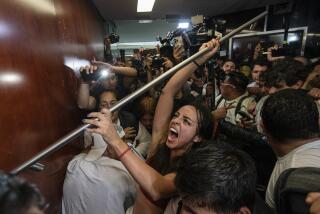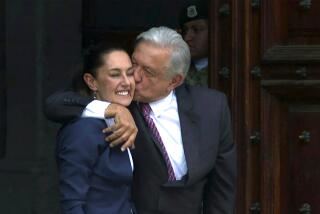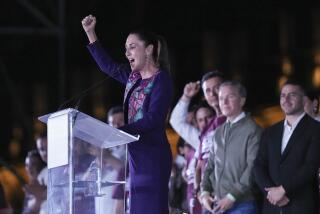Mexico City a State? Test Vote Points to a ‘Yes’
- Share via
MEXICO CITY — At subway stops, shopping centers, parks and public markets, residents of the capital voted Sunday on whether they want to become a state and elect their local officials, currently appointed by the president.
Exit polls indicated that the plebiscite produced the expected resounding “yes,” although results will not be announced until early today.
Despite the 70% approval for statehood, turnout for the election--which is not legally binding and has received little publicity--was lower than organizers had hoped.
Fewer than 400,000 people voted, and organizers acknowledged before the voting began that they needed at least 500,000 votes for the plebiscite to be considered a success.
“I don’t know what this is all about,” one passerby angrily told polling officials who insisted he vote at a table on busy San Cosme Avenue in a working-class neighborhood. He then walked away briskly as they approached other potential voters.
A poll last week by the leftist Democratic Revolutionary Party, known by its Spanish initials PRD, found that 72% of the city’s residents knew nothing about the plebiscite. Nevertheless, on Sunday, supporters stood near polling places, enthusiastically encouraging people to vote.
A heavy turnout would have increased pressure to reform a system that leaves the Mexicans who live in the capital, or Federal District--one-fifth of the nation’s population--with virtually no say in how the city is run. The mayor is really a regent appointed by the president, who also appoints all other city officials.
The vote was also a measure of the discontent with the way one of the world’s largest, most polluted cities is administered and a reflection on Mayor Manuel Camacho, a leading contender in the 1994 presidential race.
The plebiscite was organized by nine members of the Representative Assembly, a sort of advisory city council of 66 members without legislative powers that was created in 1988. They asked for votes of yes or no on three questions: Should the Federal District become a state? Should public officials in the Federal District be elected by popular vote? Should the Federal District have a legislature?
Organizers, who belong to three different political parties, got no support from the government.
Instead, they relied on grass-roots committees, many of which date from the 1985 earthquake when citizens organized themselves to dig their city out of the rubble. Lacking television air time, they publicized the vote with rock concerts, soccer games and even a wrestling match featuring Super Barrio, a wrestling star costumed as a populist crusader.
Through those efforts, they recruited enough volunteers to staff roughly 3,000 polling places.
More to Read
Sign up for Essential California
The most important California stories and recommendations in your inbox every morning.
You may occasionally receive promotional content from the Los Angeles Times.










